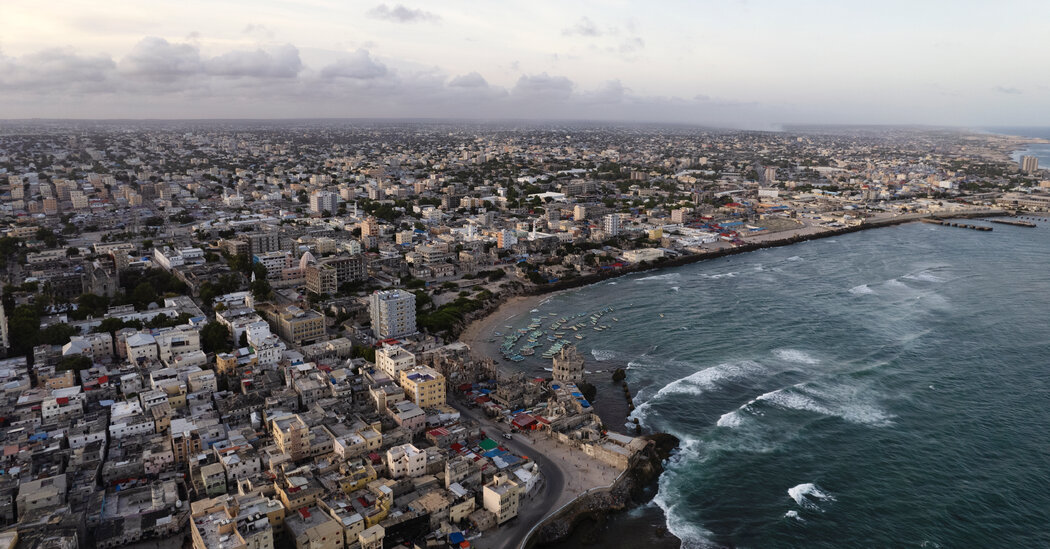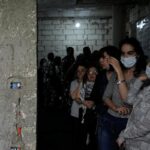
MOGADISHU, Somalia — Every month, Abdow Omar, who runs a business importing flour and sugar, gets a call from the Somali militant group Al Shabab reminding him that it’s time to pay them taxes — or risk losing his business, or even his life.
After more than 16 years, the Shabab, a terrorist group linked to Al Qaeda, now has a firm grip on much of Somalia — extorting taxes, judging court cases, forcibly recruiting minors into its forces and carrying out suicide bombings.
The country is about to get its next leader on Sunday in an election that has been delayed for almost two years. No less than 38 candidates, including one woman, registered to vie and unseat the incumbent president. But many residents, observing the government’s infighting and paralysis, are asking whether a new administration will make a difference at all.
“While the government is busy with itself, we are suffering,” Mr. Omar said. “The Shabab are like a mafia group. You either have to obey them or close your business. There’s no freedom.”
Somalia, a nation of 16 million people strategically located in the Horn of Africa, has suffered for decades from civil war, weak governance and terrorism. Its central government has been bolstered by United Nations peacekeepers and Western aid, including billions of dollars in humanitarian aid and security assistance from the United States, which sought to keep the country from becoming a safe haven for international terrorism.
Now, inflation is climbing, and food prices are sharply on the rise because of a biting drought and the loss of wheat imports from Ukraine.
The country doesn’t have a one-person, one-vote electoral system. Instead, more than 325 lawmakers, who were chosen by clan representatives, will select the next president.
Al Shabab exploited the political instability, and the bitter divisions among security forces, to grow its tentacles. In the weeks and months before the vote, the group killed civilians including at beachside restaurants, mounted a major offensive on an African Union base — killing at least 10 peacekeepers from Burundi — and dispatched suicide bombers to jump on the cars of government officials.
In interviews with more than two dozen Somali citizens, lawmakers, analysts, diplomats and aid workers before Sunday’s vote, many expressed concern at how the deteriorating political, security and humanitarian situation has reversed the few years of stability the nation achieved after Al Shabab was kicked out of the capital in 2011.
“These were five lost years, ones in which we lost the cohesion of the country,” said Hussein Sheikh-Ali, a former national security adviser to President Mohamed and the chairman of the Hiraal Institute, a research center in Mogadishu.
The protracted political battles, particularly over the elections, undermined the government’s ability to deliver key services, observers say. Critics and opposition figures have accused President Mohamed of trying to cling to power at all costs, exerting pressure on the electoral commission, installing leaders in regional states who would help sway the election and trying to fill the parliament with his own supporters. Last year, when he signed a law extending his rule by two years, fighting broke out in the capital’s streets, forcing him to change course.
As the election of lawmakers got underway, observers said it was rife with corruption and irregularities.
Abdi Ismail Samatar, a first time senator who is also a professor at the University of Minnesota who researches democracy in Africa, said this election could be ranked as “the worst” in Somalia’s history.
“I don’t think I could have ever imagined how corrupt and self-serving it is,” Mr. Samatar said. While no one attempted to bribe him, he said, “I saw people being given money in the election for the speakership right in front of my face in the hallway.”
Larry E. André, Jr., the U.S. ambassador to Somalia, said that the majority of the seats had been selected by regional leaders, “sold” or “auctioned,” and the messy election had pushed the country to the “cliff’s edge.”
The United States imposed visa sanctions in both February and March on Somali officials and others accused of undermining the parliamentary elections. The parliamentary vote finally concluded in late April, producing new speakers and deputy speakers mostly aligned with groups opposed to President Mohamed.
Because of the indirect nature of the vote, presidential candidates in Mogadishu aren’t shaking hands with citizens or campaigning in the streets. Instead, they are meeting with lawmakers and clan elders in glitzy hotels and compounds guarded by dozens of soldiers and blast walls. Some aspirants have put up election billboards along major roads in the capital, promising good governance, justice and peace.
But few in this seaside city believe they would make good on their pledges.
“Everyone wears a suit, carries a briefcase and promises to be as sweet as honey,” said Jamila Adan, a political science student at City University. “But we don’t believe them.”
Her friend Anisa Abdullahi, a business major, agreed, saying those running for office cannot identify with the daily tribulations facing ordinary Somalis. Security forces, she said, frequently block roads unannounced to create safe corridors for politicians, making it impossible for her and many others to get to class, do business or visit relatives.
“They never make people feel like the government comes from the people and is supposed to serve the people,” she said.
Some Somalis have now turned to the Shabab to get services that would normally be delivered by a functioning state. Many in Mogadishu regularly travel to areas dozens of miles north of the city to get their cases heard at Shabab-operated mobile courts.
One of them is Ali Ahmed, a businessman from a minority tribe whose family home in Mogadishu was occupied for years by members of a powerful tribe. After he presented his case to a Shabab-run court, he said, two weeks later the court ruled that the occupiers should vacate his house — and they did.
“It’s sad but no one goes to the government to get justice,” he said. “Even government judges will secretly advise you to go to Al Shabab.”
Some officials admit the government’s own shortcomings. Al Shabab has been able to widen its tax base because “elected officials were too busy politicking instead of doing policy work,” said one government official who spoke on the condition of anonymity because they were not authorized to speak to the media.
The election comes as parts of Somalia face the worst drought in four decades. Some 6 million people, or about 40 percent of the population, are facing extreme food shortages, according to the World Food Program, with nearly 760,000 people displaced.
Many of those impacted by the drought live in Shabab-controlled areas in south-central Somalia, where aid organizations are not able to reach them, crops are failing and the Shabab demands taxes on their livestock, according to interviews with officials and displaced people. The U.N. estimates that almost 900,000 people reside in inaccessible areas administered by Al Shabab.
To find food and water, families travel hundreds of miles, sometimes on foot, to cities and towns like Mogadishu, and Doolow in the southern Gedo region. Some parents said they buried their children on the way while others left a weak child behind in order to save other offspring.
Mohammed Ali Hussein, the deputy governor of Gedo, said the lack of security prevented officials from rescuing people in Shabab-dominated areas even when family members pinpoint an exact location.
Dealing with the threat of the Shabab will be among the first challenges facing Somalia’s next government, said Afyare Abdi Elmi, executive director of the Heritage Institute for Policy Studies in Mogadishu.
But the next leader, he said, needs also to deliver a new constitution, reform the economy, deal with climate change, open dialogue with the breakaway region of Somaliland and unite a polarized nation.
“Governance in Somalia became too confrontational over the past few years. It was like pulling teeth,” Mr. Elmi said. “People are now ready for a new dawn.”




